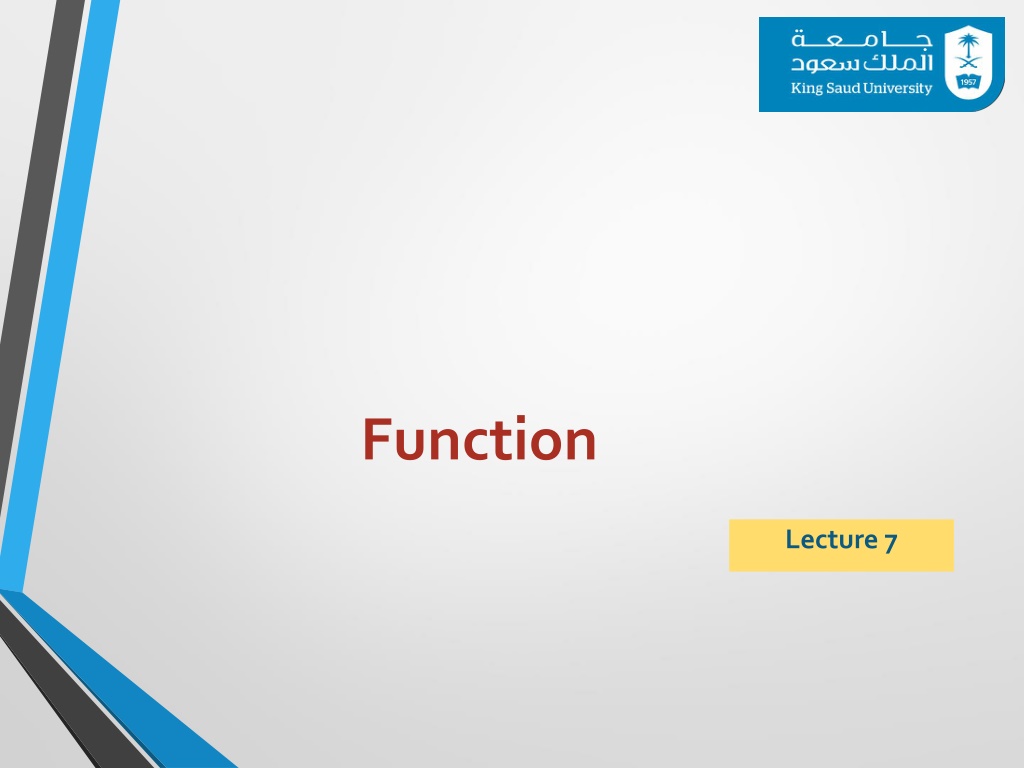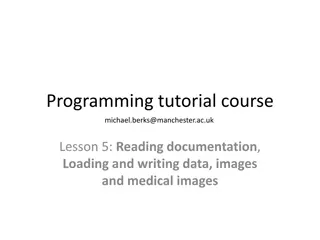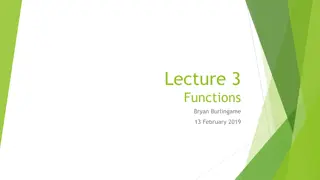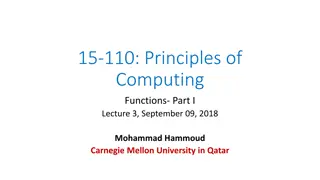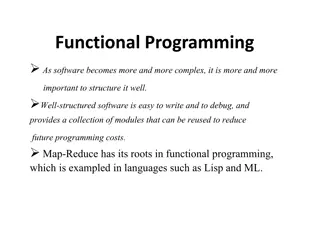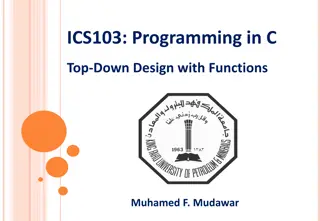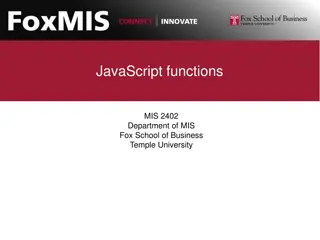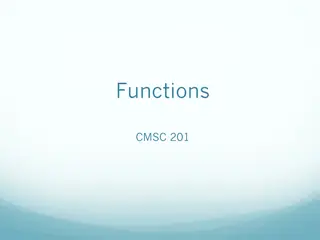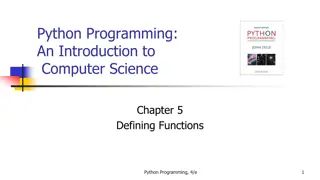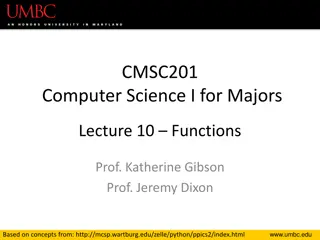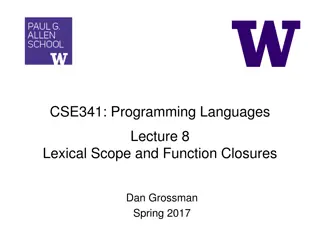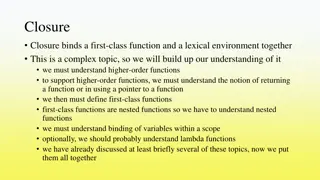Understanding Functions in C Programming
Functions play a vital role in C programming by enabling the execution of specific tasks. They can be pre-defined or user-defined, offering flexibility and efficiency in code organization and execution. Pre-defined functions are already available in C libraries, while user-defined functions are custom-created by programmers. This lecture covers the types of functions, such as arithmetic functions, function calls in assignment statements, and examples of using pre-defined functions. Understanding functions is essential for writing structured and efficient C programs.
Download Presentation

Please find below an Image/Link to download the presentation.
The content on the website is provided AS IS for your information and personal use only. It may not be sold, licensed, or shared on other websites without obtaining consent from the author. Download presentation by click this link. If you encounter any issues during the download, it is possible that the publisher has removed the file from their server.
E N D
Presentation Transcript
Function Lecture 7
Functions A function is a subprogram that performs a specific task. Functions you know: cout << Hi ; cin >> number;
Pre-defined and User-defined Functions Pre-defined Function Is a function that is already defined in one of the many C libraries. It is included in the program through the preprocessor directive statement #include< > and used in the program to perform a specific task. Ex: #include<iostream> Defines printf & scanf functions User-defined Function Is a function that is created by the user. It is defined before the main program through a function prototype and called upon in the main program to perform a specific task.
Pre-defined Functions Arithmetic Functions Are functions that perform arithmetic operations. They are usually located in the cmath libraries. (see page 109). Examples: abs(x) is a function that returns the absolute value of its integer argument. sqrt(x) is a function that returns the square root of x.
Pre-defined Functions Function call in an Assignment Statement Syntax Y = function name(argument); Example Y = sqrt(x); function call function sqrt square root computation y x
Pre-defined Functions Examples x = -5 y = abs(x) y = 5 x = 90 y = abs(x) + 2 y = 92 x = 10 y = sqrt(x + 6) y = 4 x = 2.25 y = sqrt(x) y = 1.25
Types of Functions 1. Program sends data to the function and receives data from the function. Ex. y=sqrt(x); y x sqrt 2. Program sends data to the function and doesn t receive data from the function. Ex. cout << Hi ; cout Hi
Types of Functions (Continue) 3. Program doesn t sends data to the function and receives data from the function. Ex. Number = Get_Number(); Number Get_Number 4. Program doesn t sends data to the function and doesn t receive data from the function. Ex. Display_Comment(); Display_Comment
Top-Down Design (Continue) Structured Chart Original Problem Subproblem 1 Subproblem 2 Subproblem 3 Detailed Subproblem 2.1 Detailed Subproblem 2.2
Advantages of Writing Functions 1. Decreases the main program s length and reduces the chance to make errors. 2. Makes it easier to define programming tasks between programmers. Each programmer can be responsible for a particular set of functions. 3. Allows procedural abstraction; a programming technique in which a main function consists of a sequence of function calls and each function is implemented separately. This helps to focus on one function at a time instead of writing the complete program all at once. 4. Allows code reuse of function programs.
Code Reuse Reusing program fragments that have already been written and tested whenever possible. It is a way to help in writing error free code.
User-defined Functions Function Prototype A way to declare a function. This tells the compiler: The name of the function The data type of received data(if there is). The type & name of sent data (if there is). Also called the parameters of the function. defines a function called drawcircle with not sent nor received data (when the program doesn t send to the function and doesn t receive from the function, the function is called a void function) Syntax ftype fname (); Example void drawcircle();
User-defined Functions Function Call A function call transfers control from the main program to the function or subprogram. Syntax fname (); Example calls function drawcircle and causes it to begin execution Drawcircle();
User-defined Functions Function Definition Defines the function operation by writing the code for the function in a similar way to writing the code for the main program. Syntax Ftype fname(void) { local declaration executable statements } does not contain the return statement because this function will not send any data to the program main function (i.e. a function should contain the return statement only if it is going to send data to the program) Example void drawcircle(void) { cout << *** <<endl; cout << * * <<endl; cout << *** endl; }
User-defined Functions Main Program void drawcircle (); Function Prototype int main() { Function Call drawcircle(); } void drawcircle () Function Definition { }
User-defined Functions Main Program void drawcircle (); Function Prototype void drawcircle () { Function Definition } int main() { drawcircle(); Function Call }
User-defined Functions Order of Execution void function1 (); void function2 (); int main() { function1(); function2(); } void function1 (); { void function2 (); { transfer of control back to program transfer of control to function1 } transfer of control back to program } transfer of control to function2
Example - Drawing a Stick Figure * * * * * / \ / \ /____\ / \ / \ / \ Draw a Figure Draw a Circle Draw a Triangle Draw Intersecting Lines Draw Intersecting Lines Draw a Base
Example - Drawing a Stick Figure /* draws a stick figure */ #include <iostream> using namespace std; void draw_circle(); void draw_intersect(); void draw_base(); void draw_triangle(); /* Function prototype */ /* Function prototype */ /* Function prototype */ /* Function prototype */ int main(void) { draw_circle(); draw_triangle(); draw_intersect(); return(0); } /* function call */ /* function call */ /* function call */ void draw_circle() { cout << " * << endl; cout << "* * << endl; cout << " * * <<endl;} /* Function definition */ (continued)
Example - Drawing a Stick Figure - Continue /* draws a stick figure - continue*/ void draw_intersect() { cout << " /\\ << endl; cout << " / \\ << endl;; cout << "/ \\ << endl; } /* Function definition */ void draw_base() { cout << "------ << endl; } /* Function definition */ void draw_triangle() { draw_intersect(); draw_base(); } /* Function definition */
Using Functions 1. Declare a function before the main program. 2. Call the function inside the main program. 3. Define a function after the main program.
Review of Syntax Function Prototype & definition an identifier that represents a corresponding actual argument in a function definition. Ex. int square(int x) ftype fname (data type name, ...); Formal Parameter List Function Call An expression used inside the parentheses of a function call Ex. square(x) fname (data type name, ...); Actual Argument List
Rules for Argument List 1. The number of actual arguments used in a function call must be the same as the number of the formal parameters listed in the function prototype and definition. 2. The Order of the arguments in the lists determines correspondence and must be the same in arguments and parameters. The first actual argument corresponds to the first formal parameter, the second actual argument corresponds to the second formal parameter and so on. 3. The data types of the actual argument and the formal parameter must match.
Example Prototype& definition: double squared (int x, double y) What is returned from the function (i.e. result) What is sent to the function Call: y = squared (x,y) What is returned from the function (i.e. result) What is sent to the function
Types of Functions 1. Program sends data to the function and receives data from the function. Prototype & definition: return_type function_name (parameter list) Call: variable_name = function_name (argument list) 2. Program sends data to the function and doesn t receive data from the function. Prototype & definition: void function_name (parameter list) Call: function_name (argument list)
Types of Functions (Continue) 3. Program doesn t sends data to the function and receives data from the function. Prototype & definition: return_type function_name (void) Call: variable_name = function_name () 4. Program doesn t sends data to the function and doesn t receive data from the function. Prototype & definition: void function_name (void) Call: function_name ()
Examples of Function Prototype & definition float squared (int number) Returns back a float type to the main program An integer type called number is sent to the function squared Void print_report (int report_number) Returns nothing to the main program An integer type called report_number is sent to the function print_report
Examples of Function Prototype & definition char get_menu_choice () Returns back a character type to the main program Nothing is sent to the function get_menu_choice Void print_comment () Returns nothing to the main program Nothing is sent to the function print_comment
Program Example 1 /* computes half of the value of x */ .......... float half_of(float k); /* function prototype */ int main() { .......... y=half_of(x); .......... } /* calling function */ float half_of(float k) /* function definition */ { k = k / 2; return(k); }
Program Example 2 /* computes the cube of num */ .......... int cubed(int x); /* function prototype */ int main() { .......... y=cubed(num); .......... } /* calling function */ int cubed(int x) { return(x*x*x); } /* function definition */
Program Example 3 /* displays the largest of two numbers */ .......... int larger(int x,int y); /* function prototype */ int main() { .......... y=larger(num1,num2); .......... } /* calling function */ int larger(int x,int y) /* function definition */ { .......... return(larger_num); }
Program Example 4 /* calculates the area and circumferencce of a circle */ .......... float find_area(float r); /* function prototype */ float find_circum(float r); /* function prototype */ int main() { .......... area = find_area(r); /* calling function */ circum = find_circum(r); /* calling function */ .......... } float find_area(float r) /* function definition */ { return(PI*POW(r,2);} float find_circum(float r) {return(2.0*PI*r)}
Example 1 #include<iostream> #include<cmath.h> using namespace std; double scale(double x, int n); int main() { double num1; int num2; cout << "Enter a real number> ; cin >> num1; cout << Enter an integer> "; cin >> num2; cout << "Result of call to function scale is \n", scale(num1,num2)); return 0; } double scale(double x, int n) { double scale_factor; scale_factor = pow(10,n); /* specified by its second argumnet */ return(x * scale_factor); } /* This function multiplies its first */ /* argument by the power of 10 */
Example 2 #include<iostream> # include<cmath> using namespace std; void print_comment(); double scale(double x, int n); int main() { double num1, int num2; print_comment(); cout << "Enter a real number> "; cin >> num1; cout << "Enter an integer> "; cin >> num2; cout << "Result of call to function scale is \n",scale(num1,num2)); return 0; } void print_comment(void) { cout << "The program will .......... \n";} double scale(double x, int n) { ..... }
Example 3 include<iostream> # include<cmath> using namespace std; double scale(double x, int n); void display(double result); int main() { double num1, result; int num2; cout << "Enter a real number> "; cin >> num1; cout << "Enter an integer> "; cin >> num2; result = scale(num1,num2); display(result); return 0;} double scale(double x, int n) { ..... } void display(double result) { printf("Result of call to function scale is %.2f\n", result);}
Example 4 #include<iostream> # include<cmath> using namespace std; double get_num1(); int get_num2(); double scale(double x, int n); int main(void) { double num1, int num2; num1 = get_num1(); num2 = get_num2(); cout << "Result of call to function scale is\n",scale(num1,num2)); return 0;} double get_num1(void) { double number1; cout << "Enter a real number> "; cin >> number1; return(number1);} int get_num2(void) { ..... return(number2); } double scale(double x, int n) { ..... }
Global and Local Declarations Local Declaration When the declaration is placed at the start of the main function or sub-functions. Global Declaration When the declaration is placed immediately after the pre-processor directives. IMPORTANT: in the C programming language local variables have precedence over global variables.
Global and Local Declarations #include <iostream> /* global declarations */ void function1(); int main() { /* local declarations */ } void function1() { /* local declarations */ }
Example 1 #include<iostream> using namespace std; void function1(); int main() { int z; z = 5; function1(); cout << The value of z inside function main is << z); return 0;} /* local declaration */ void function1() { int z; cout << The value of z inside functin1 is << z);} /* local declaration */ Unknown The value of z inside function1 is -427365653 The value of z inside the function main is 5 Press any key to continue
Example 2 #include<iostream> using namespace std; int z; /* global declaration */ void function1(); int main() { int z; z = 5; function1(); cout << The value of z inside function main is << z ; return 0;} /* local declaration */ Gives the same result as the previous program since local declarations have precedence over global declarations void function1() { int z; cout << The value of z inside functin1 is << z);} /* local declaration */ The value of z inside function1 is -427365653 The value of z inside the function main is 5 Press any key to continue
Example 3 #include<iostram> using namespace std; int z; /* global declaration */ void function1(); int main() { int z; z = 5; function1(); cout << The value of z inside function main is \n <<z); return 0;} /* local declaration */ void function1() { int z; cout << The value of z inside functin1 is \n << z);} /* local declaration */ The value of z inside function1 is 5 The value of z inside the function main is 5 Press any key to continue
Example 4 #include<iostream> using namespace std; int z = 2; /* global declaration */ void function1(); int main() { int z = 5; function1(); cout << The value of z inside function main is \n << z); return 0;} /* local declaration */ void function1() { int z; cout << The value of z inside functin1 is \n << z);} /* local declaration */ The value of z inside function1 is 2 The value of z inside the function main is 5 Press any key to continue
Example 5 #include<iostream> using namespace std; int z; /* global declaration */ void function1(); void function2(); int main() { z = 5; function1(); cout << The value of z inside function main is \n <<z); function2(); cout << The value of z inside function main is\n << z); return 0;} void function1() { int z; z = 10; cout << The value of z inside functin1 is \n << z);} /* local declaration */ void function2() {cout << The value of z inside functin2 is \n << z);} The value of z inside function1 is 10 The value of z inside the function main is 5 The value of z inside function2 is 5 The value of z inside the function main is 5 Press any key to continue
Example 6 #include<iostream> using namespace std; int z; /* global declaration */ void function1(); void function2(); int main() { z = 15; function1(); cout << The value of z inside function main is \n << z); function2(); cout << The value of z inside function main is \n << z); return 0;} void function1() { int z; z = 11; cout << The value of z inside functin1 is \n << z);} /* local declaration */ void function2() { int z; cout << The value of z inside functin2 is \n << z);} /* local declaration */ The value of z inside function1 is 11 The value of z inside the function main is 15 The value of z inside function2 is -757457774 The value of z inside the function main is 15 Press any key to continue Unknown
